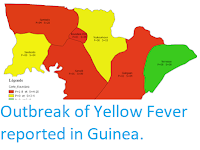The World Health Organization has reported an outbreak of Yellow Fever in Senegal, West Africa, with seven cases reported since October 2020. The first case, in a 40-year-old female patient from Kidira in the east of the country, was reported on 18 October, and confirmed by tests carried out at the Institut Pasteur de Dakar on 29 October. On 31 October an eight-year-old boy, also from Kidira, was also reported to have contracted the Virus and subsequently died of the disease. On 5 November a second death occurred in Kidira, this time a 23-year-old patient. A fourth case, this time in a fifteen-year-old male patient, was reported from Kidira on 16 November. A further three cases have been reported in Matam, Tambacounda and Kedougou, although no further fatalities have been reported.
Yellow Fever is a Mosquito-born Flavivirus (the group of RNA Viruses that also includes the West Nile, Zika and Hepatitis C Viruses). The Virus causes a mild fever, accompanied loss of apatite, nausea and muscle pains, which passes within about 15 days. However, in about 15 % of cases a more severe infection attacks the liver and kidneys, which can lead to their failure, and therefore the death of the patient. It originated in tropical Africa and but was carried to South America and the Caribbean during the trans-Atlantic slave trade. Outbreaks of the disease have also been recorded in parts of tropical Asia and the Pacific in recent years, and many countries in tropical regions require visitors to carry a certificate proving they have been vaccinated against the Virus.
Senegal has caried out a national program of vaccinations against Yellow Fever since 2005, however the country, particularly the eastern regions, is still considered to be a high risk for the disease, due to the persistence of the disease in wild Primates, and there are concerns that the vaccination program may have been disrupted this year by the Covid-19 epidemic.
See also...








